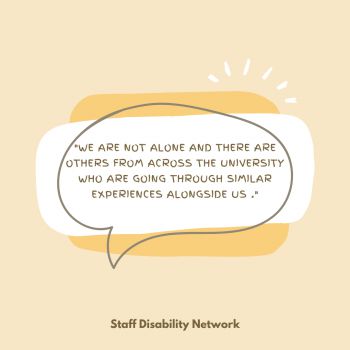News
Chronic Fatigue at Work: An Open Discussion
Posted on behalf of: Staff Disability Network
Last updated: Tuesday, 19 November 2024

On Wednesday 23rd October, staff network members at the University of Sussex were invited to attend the open discussion Chronic Fatigue at Work, explore what chronic fatigue looks like from different perspectives and discuss day-to-day management of this condition.
This was a joint network event for members of the Staff Disability Network,Neurodiversity Staff Network and the Long Covid and Chronic Fatigue Support Network at the University of Sussex. The conscious decision to open the group to network members only, created a safe and welcoming environment, free of judgement, helping those who wanted to contribute to feel comfortable in doing so.
Chloe Ilsley hosted the event. Chloe is the Staff Disability Network Chair, as well as Senior Student Engagement Coordinator in the School of Engineering and Informatics. She shared her experiences of fatigue, touching upon how it feels to be new to this experience. Chloe explained how the session welcomed other people’s experiences and thoughts, and how she hoped the discussion would help her manage her own symptoms.
The discussion began with Chloe reading a written account by Long Covid and Chronic Fatigue Support Network member. The monologue shared how the individual was diagnosed with ME/CFS (Myalgic encephalomyelitis, also called chronic fatigue syndrome) which came on suddenly in March 2021. Prior to this, they were an active person, with no significant health conditions impacting their daily life. They described their cognitive symptoms and how medication and ‘pacing’ help them. Pacing is when someone limits the amount of energy they spend on each activity to ensure they can make it last for the day.
This powerful and personal account was followed by words by a staff disability network member, who shared a visual tool which pictured how chronic fatigue can impact individuals in a variety of mental, physical and cognitive ways. The image accompanied examples of lived experiences and what coping mechanisms help when managing their symptoms. These insightful words were received with kindness by the group, as suggestions on ways to talk about symptoms and various forms of coping mechanisms filled the comment section.
The second half of the session focused around the rest of the group, who comfortably shared examples of their own experiences with fatigue. It became a brave, honest, thought-provoking and enjoyable discussion.
Overall, the open discussion demonstrated that Chronic Fatigue is experienced by many, however the range of symptoms and coping mechanisms highlighted that it’s a complicated diagnosis and deeply personal to each individual.
If you missed this event and want to catch up, you can watch the first section online and read notes from the open discussion portion. Please contact the Staff Disability Network for access details. Please email staffdisabilitynetwork@sussex.ac.uk
More information about Staff Networks
The Long-Covid and Chronic Fatigue Support Network welcomes people with ME/CFS (not necessarily stemming from Covid) and people who experience fatigue daily or very often. To join, contact the EDI team at edi.unit@sussex.ac.uk
The Staff Disability Network is for Sussex Staff who self-identify as having a disability. The network hosts termly drop-ins for a chance to share confidential feedback, offers email support and have a Teams channel for peer-to-peer connection. The network seeks to raise awareness across campus with events and advocacy within decision-making and policy change. If you would like to join the network, please email staffdisabilitynetwork@sussex.ac.uk with your request to join.
The Neurodiversity Staff Support Network aims to support staff (including Doctoral Researchers, Faculty and Professional services) who identify with neurodivergence or are curious about neurodivergence. Neurodivergence sits across social identity and medical conditions that includes but is not limited to ADHD, Autism, Dyslexia, Dyspraxia and Dyscalculia. The Network operates and meets predominantly through Microsoft Teams where staff are able to connect with each other, share helpful resources and provide peer support.
You can find out more about staff networks, how to join what they do to support communities at the University of Sussex by visiting thestaff network webpages.
Further information: https://www.sussex.ac.uk/equalities/networks/staffnetworks

